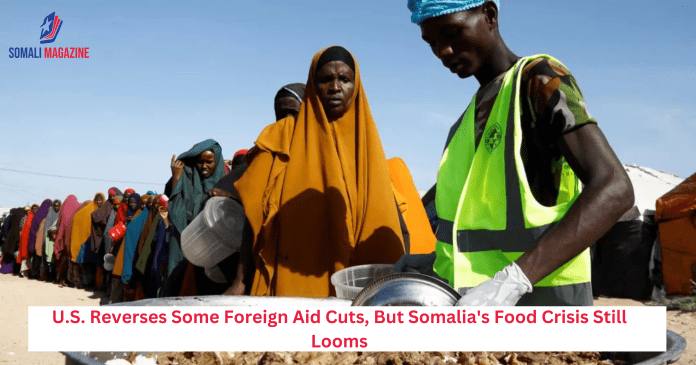Facebook Twitter (X) Instagram Somali Magazine - People's Magazine
Reinstated funds offer brief hope, but uncertainty remains for over 6 million Somalis facing hunger as aid groups await full clarity on U.S. food assistance policies
On Tuesday, aid organizations and people relying on food aid in Somalia were left uncertain and worried. This came after the U.S. government suddenly changed its decision on cutting emergency food aid to several countries.
On Wednesday, officials announced that the Trump administration had taken back some of the cuts to food aid that had been planned for over a dozen countries. However, reductions in funding for Afghanistan and Yemen—two of the world’s poorest and most war-torn nations—are still in place.
These funding cuts were part of a wider push by the Trump administration to reduce foreign aid. The initiative was led by billionaire Elon Musk’s Department of Government Efficiency. Under this program, the U.S. had initially pulled back funding from multiple countries, including Somalia.
Two officials from the United Nations (UN) said the U.S. government informed the World Food Program (WFP) on Tuesday that it was reversing some of the cuts. A spokesperson from the U.S. Agency for International Development (USAID) also confirmed that Jeremy Lewin, a key Musk associate responsible for reshaping USAID, had called for the cancellation of some contract terminations that had happened over the weekend. This decision came shortly after the Associated Press published a story about the cuts.
These UN officials chose to remain anonymous because they were not allowed to speak publicly about the matter.
On Monday, the WFP had said it received news from USAID about major cuts to its emergency food programs in 14 countries. As of Wednesday, it still wasn’t clear how many of those cuts were still happening or which programs were saved.
Mohamed Elmi Afrah, a longtime aid worker and political expert, spoke about the serious risks these cuts could have on Somalia. “The people who will suffer the most are mothers, breastfeeding women, and children. These are the most vulnerable groups who rely on aid to survive,” he explained.
Mustafa Diriye, a logistics manager at Lusidle Petroleum and Logistics LTD—a company that works with WFP—said he was shocked when he first heard about the cuts. “It was completely unexpected, and it had an immediate impact on us,” he said.
The WFP office in Somalia posted a warning on X (formerly Twitter), saying the potential cuts would have devastating effects. They said, “U.S. funding is crucial for food assistance in Somalia. It helps us cover 90% of urgent hunger needs. If these cuts go through, we will have to stop food aid by next month, putting 620,000 people at risk of extreme hunger.”
Right now, more than 6 million people in Somalia are struggling with serious food insecurity, according to the UN. Years of conflict, droughts, floods, and economic hardships have made it very difficult for people—especially those in rural and displaced communities—to get enough food.
The United States has been the biggest supporter of the WFP, giving $4.5 billion out of the $9.8 billion total the organization received last year. Previous U.S. governments believed that helping other countries with food aid was a way to reduce global conflict, fight poverty, stop extremism, and lower the number of people trying to migrate to other countries.
However, the Trump administration has criticized USAID for pushing what it calls “liberal agendas” and views foreign aid as a waste of American money. So far, U.S. officials haven’t responded to media questions about the changes.
On Tuesday, State Department spokesperson Tammy Bruce admitted that some program cuts had been made by mistake and said that some of the funding had been restored. She did not offer more specific details.

